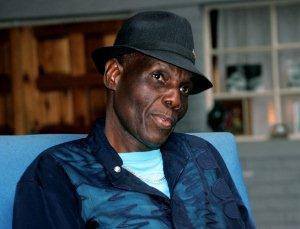
Sometime in 2011, Thomas Mapfumo reportedly took a swipe at Winky D saying the dancehall musician was destroying Zimbabwean music because of lack of originality. Mapfumo was quoted as saying only Winky D’s friends and relatives would buy his music.
Drumbeat with Godwim Muzari
Although the two musicians later discussed the issue and announced they had made peace, Winky D recently released a video that mocks Mapfumo. The feud, that started two years ago, seems to be raging on.
Apparently, Winky D — a dancehall musician from the young generation — has lost respect for Mapfumo, a legendary musician of immense talent, because of that altercation.
While Mapfumo is no stranger to hard-hitting statements, his aim at a musician of Winky D’s stature left a lot to be desired.
This Mapfumo-Winky D case is one of the many episodes when established artists pick fights with their upcoming counterparts for different reasons.
Alick Macheso did it through his song titled Murondatsimba from the album Vapupuri Pupurai that accused upcoming musicians of being copycats. Joseph Garakara penned a song on his album KechiOne Nezai to counter Macheso’s assertion. Mapfumo had a similar fight with the late Farai “Pio” Macheka who played chimurenga music.
At the advent of urban grooves music, most established musicians wrote off the youngsters as mere copycats that thrived on localising Western music and had no future in the industry.
- Chamisa under fire over US$120K donation
- Mavhunga puts DeMbare into Chibuku quarterfinals
- Pension funds bet on Cabora Bassa oilfields
- Councils defy govt fire tender directive
Keep Reading
While it is good for experienced musicians to reprimand their youngsters when they take the wrong way in the industry, some ways of communication can be discouraging.
In worst cases, the upcoming musicians hit back and the cases become messy.
When Winky D hit back at Mapfumo, he deliberately compared him with Oliver Mtukudzi presenting the latter as a fatherly figure.
Although the dancehall musician made a mistake in comparing the two great musicians, there is an element of truth in his reference to Mtukudzi.
When there is a topic on any local discussion related to supporting young musicians, Mtukudzi gets credit.
Besides grooming artists at his Pakare Paye Arts Centre in Norton, the musician seems to have a penchant for working with fellow musicians regardless of age, genre or origin.
He has worked with a number of musicians close to his stature on the international scene and has always looked back to accept requests from various local artists asking for assistance.
Munya Mataruse plays music similar to Mtukudzi’s but, instead of getting jealous, the latter has kept the former under his wings with good results. In terms of putting his voice on many upcoming and established musicians’ albums, Mtukudzi has tried his best.
He has worked with Sulumani Chimbetu, Jah Prayzah, Jean Masters, Willom Tight, Ex-Q and Fungisai Zvakavapano-Mashavave among others.
These musicians are from various genres. Many of them have confessed that they have been given professional advice lyrically and in terms of arrangement, but Mtukudzi does not blow a horn or laugh off the musicians’ poor products.
Recently, Enisia Mashusha of Mambokadzi band was elated with the way she was assisted by Mtukudzi. It is a sign of preparing the young generation to take over and a manifestation of abundant willingness to mould local talent.
Mtukudzi is not alone in this crusade. Charles Charamba has worked with a number of upcoming musicians and he recently took Peter Moyo for vocal lessons. As bad as Moyo’s voice was, Charamba refused to see a failure in the young musician.
The spirit of mentorship should exist among our established musicians so that they groom their youngsters. The music industry has to remain vibrant; jealousy or hatred will hamper the transition.
Macheso has done his part
After realising how his attack on alleged copycats could backfire, Alick Macheso did collaborations with the late Beater Mangethe, Energy Mutodi, Tryson Chimbetu and Bishop Ollah Juru.
Although Macheso is said to have short-changed Romeo Gasa at a musical gala late last year in apparent protest against the latter’s mimicry, the sungura king deserves recognition for working with young musicians.
He has assisted Leonard and Tendai Dembo as well as Progress Chipfumo through live shows.











